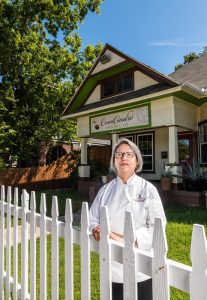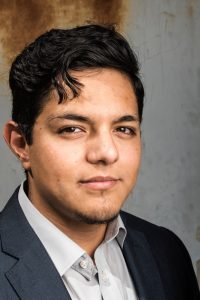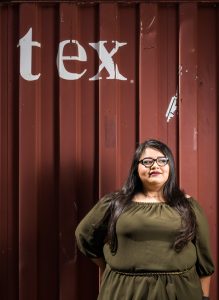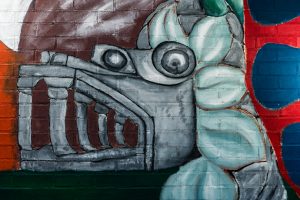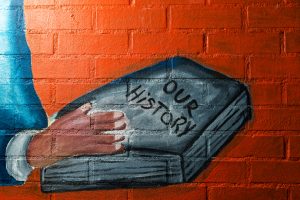More than 11 million undocumented immigrants live in the United States. And some of them are our neighbors. They work and go to school here, and they contribute to our economy and culture. Immigrants, undocumented and otherwise, are responsible for keeping Oak Cliff commercial districts in business during the 1980s and ’90s.
Undocumented immigrants live in near-constant fear of deportation, not to mention the stigma of being considered criminals because of their work status.
This month, we introduce you to a few of our neighbors who formerly were undocumented workers. They now have work permits and exemption from deportation because of Deferred Action for Childhood Arrivals, the executive order from president Barack Obama, or amnesty granted in 1986 from the Reagan administration. But some of them worry that everything they’ve worked for somehow could be taken away.
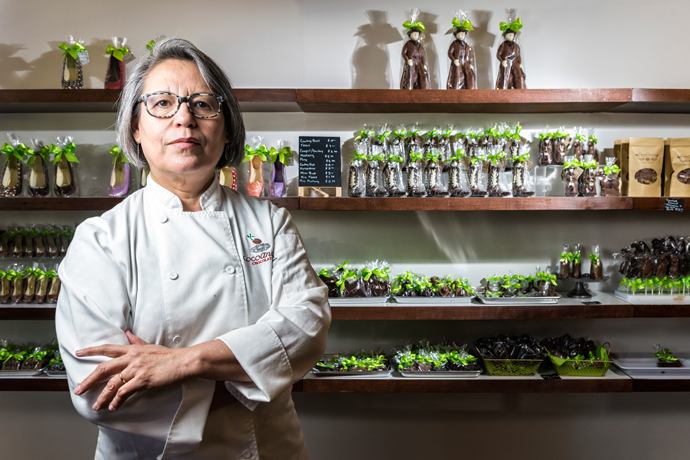
Andrea Pedraza, Coco Andre Photo by Danny Fulgencio
Chocolate and perseverance
Andrea Pedraza came to the United States as a young undocumented worker in the early ’70s.
She became a union seamstress, sewing dresses for Neiman Marcus and Oscar de la Renta, when clothes were still manufactured in the U.S.
When the Reagan administration granted amnesty to about 3.2 million undocumented workers in 1986, Pedraza and her husband were among them.
Now she is a small-business owner operating CocoAndré chocolate shop in a building she and her family own on West Seventh at Adams.
Recently, she and her daughter, Cindy Pedraza Puente, were guests at the White House as part of a conference on Latinas and education.
Pedraza learned the chocolate trade in 25 years as production manager at Morgen Chocolates, the first European-style chocolatier in Dallas.
After the economic crash of 2009, she was 52, out of work and over-skilled. Her daughter, Cindy, had just been laid off from a tower crane company. So they decided to start their own business.
“We weren’t foodies,” Puente says. “We didn’t know anything about the culinary world.”
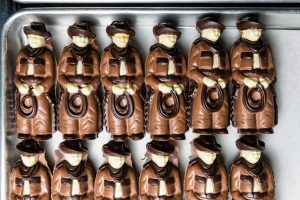
Coco Andre Chocolatier, photo Danny Fulgencio
They found a small space on West Davis at Tyler, where the rent was cheap in 2009, and their landlord didn’t start charging them until they’d opened their doors. Pedraza’s husband, Rey, and her brother Martin fixed the place up in seven weeks, and they opened with one small table of perfect chocolates a few weeks before Christmas.
“Every year, the business kept building, but we knew the rent was going to increase,” Pedraza says.
So two years ago, they bought their building on Seventh. It took a year to renovate that building and obtain city permits to open.
Pedraza spent 12-hour days working with city code enforcement, making chocolates and overseeing construction.
“I didn’t stop and feel sorry for myself,” she says. “I just said, ‘What is the next step?’ ”
Once the building was ready to go, however, the Pedrazas lacked operating capital. So they applied for and received a low-interest loan from the Tori Burch Foundation.
“This isn’t just about us. I represent so many other women who work so hard to achieve their dreams,” Pedraza says.
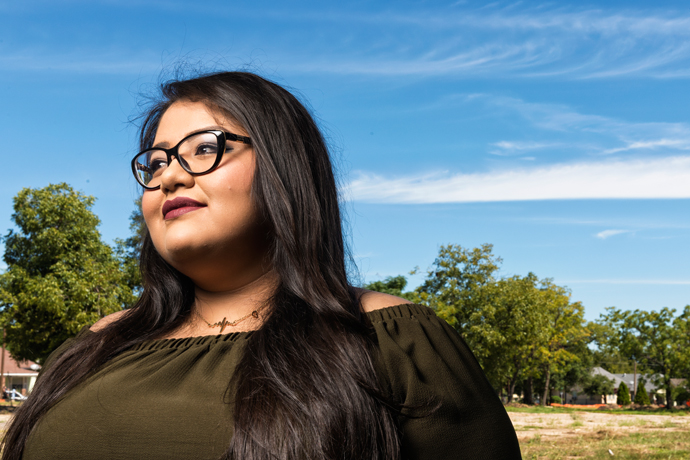
Blanca Castillo, photo by Danny Fulgencio
A nurse with no country
After Blanca Castillo graduated with a nursing degree from Texas Woman’s University, she had to go back to her high school job, working the drive-through at a fast-food restaurant.
Without a social security number, she couldn’t sit for the NCLEX, the test for certification as a registered nurse.
She’d graduated salutatorian from Townview High School. She attended TWU on the presidential scholarship. She completed her clinical work and walked across the stage to accept her degree.
And she worked at Wendy’s.
Castillo’s mom brought her across the border from Mexico right after the girl’s father died. She was 6 years old.
At Hogg Elementary School in Oak Cliff, teachers told her she needed to go to college. “I didn’t even know what college was,” she says. Her mother had attended school only until about age 10.
But teachers told her she was smart and that she had to work hard to get out of her situation.
They were right.
After being accepted into Townview’s certified nursing assistant program, she had to give up her spot because it required a social security number.
Around the time of high school graduation, it was suggested she should “let someone else be salutatorian” since she was undocumented.
A couple of TWU professors treated her coldly after learning her work status, she says.
And then, after all that, she had to go back to Wendy’s.
But six months after graduation came Obama’s executive action, which allows certain undocumented immigrants who were brought here as children to receive renewable two-year work permits.
“It was such a happy day,” she says.
Once she got a work permit, she landed a job as a volunteer coordinator at Methodist Dallas Medical Center. An uncle in Chicago paid for her NCLEX study course — by then it had been two years since graduation — and she passed it on the first try.
Methodist hired her, now as a registered nurse, to work on its sixth floor in cardiology. That was three years ago.
“I still get excited to tell people I’m a nurse,” Castillo says. “I feel very empowered by where I come from because it’s made me work harder for what I do have, and it’s made me appreciate it more.”
She constantly worries, however, that one day her work permit won’t be renewed. Family members tell her she should buy a house, and she wants that too. But she’s afraid to spend money. What if her permit isn’t renewed and she can’t continue working here?
“I was 6 years old. I’ve done the best that I can,” she says. “If it did get taken away, I would lose my identity. I don’t know who I would be.”
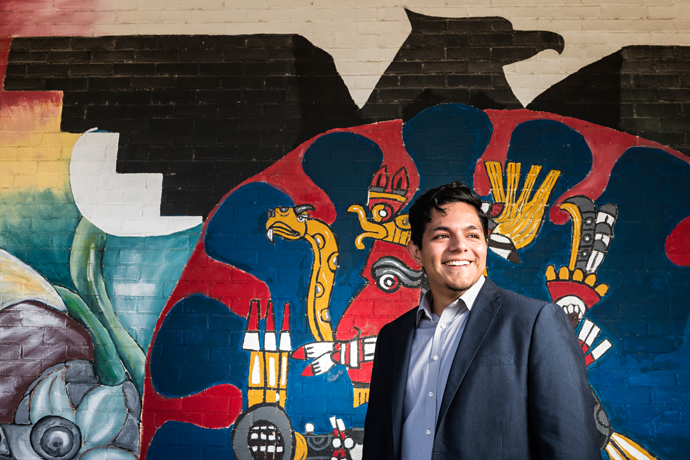
Everardo Amaya, Photo by Danny Fulgencio
A community builder
A guy walked up to Everardo Amaya when he was visiting his old school, Eastfield College Pleasant Grove campus, and asked a question.
He said, “Hey, how do you go here?”
Amaya took 20 minutes to explain the concept of community college and brought him to speak with a counselor.
“What you say to someone can eventually turn into something great, or it can break their spirit,” he says.
Words matter.
Amaya graduated from the University of North Texas at Dallas in 2014 with a degree in nonprofit management. He was brought to the United States from Durango, Mexico when he was 13.
Now 25, Amay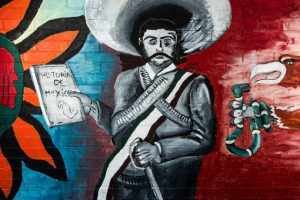 a works as a program coordinator at Habitat for Humanity. He has that privilege because of Obama’s executive action.
a works as a program coordinator at Habitat for Humanity. He has that privilege because of Obama’s executive action.
“My parents would always tell me that the only way out of the struggle of being an immigrant is education, so I took that to heart,” he says.
Before the deferred action, Amaya had to turn down job offers and scholarships.
Once he received a work permit, however, his life changed.
He received an academic scholarship to UNT Dallas. He did an internship and took a fulltime job right after graduation, none of which would’ve been possible otherwise. He now lives comfortably in Oak Cliff, but it’s never far from mind that all this could be temporary.
Amaya has an 18-year-old sister who could sponsor him for citizenship when she’s 21. And he could eventually marry his boyfriend, who is a U.S. citizen.
In the meantime, he helps build communities with Habitat for Humanity. He volunteers to read to elementary school children through Reading Partners. He can’t vote, but he volunteers with LULAC campaigns to register voters. Amaya says his dream in life is to be a part of breaking the cycles of poverty.
“I’m a product of all this opportunity that we’ve brought to southern Dallas,” he says. “I try to pay it forward.”
More photos…
- Andrea Pedraza, owner of Coco Andre Chocolatier
- Everado Amaya, photo by Danny Fulgencio
- Blanca Castillo, photo by Danny Fulgencio

